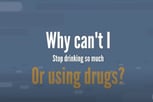Society’s approach to addiction is like the story of a priest who lost his keys. When a parishioner saw him on his knees under a streetlight, he said, “Father, are you all right?”
“Yes, yes,” replied the priest. “I’ve just lost my keys.” With significant relief and some confusion, the man said, “I’ll help you look. Did you lose them here?”
“No,” replied the priest, “I lost them at home, but the light is better here.”
Similar to the priest, we have continued to look for solutions to addiction where answers are impossible to find only because that place is easy to see: the substance being used or overused. To the casual observer, it’s simply a matter of abusing a substance because one enjoys its effects. But when it comes to addiction, substance use is only the tip of the iceberg.
Focusing on stopping drug use among people who feel normal only when they are using hasn’t worked for 100 years. It won’t start working next Tuesday, either, no matter how much we try.
Societal Whack-a-Mole
Opioids have been getting cheaper and easier to obtain over the past 30 years, and for some, it was easy to see the crisis coming. Others, like those who wield the money for research and treatment, are only just waking up to it and are focusing intently on the substance itself.
In past crises, lawmakers and bureaucrats concentrated on other substances such as cocaine, alcohol, and marijuana. As in these previous crises, we’ll beat back opioid overdoses. But we’ll still be left with the cause of the crisis, which will lead to the next crisis.
The problem isn’t just opioids: The root of the problem is a brain illness called “addiction.” If we don’t treat addiction as a whole illness and focus only on the drug de jour, then we will play this societal game of whack-a-mole forever, knocking down one drug only to see another spring up.
Brain Disease vs. Consequence
The traditional paradigm of addiction, provided by the American Psychiatric Association, sees everyone as normal. Then, some start using drugs, the drugs cause them to become hooked, and they show symptoms and meet the criteria for addiction. Under this definition, ceasing drug use meant the illness was dormant, and any other symptoms had to be the result of a second diagnosis.
The new American Society of Addiction Medicine definition recognizes addiction as primarily a brain illness. Its symptoms drive people to seek various substances and behaviors for reward or relief. Once someone stops using, we would expect that person to show the symptoms that caused drug use in the first place.
Under this definition of addiction, patients who stop using may still have to undergo treatment and recovery to alleviate the underlying illness.
Treating the Disease of Addiction
Once we realize that addiction is a primary illness, rather than a consequence of using drugs, our focus on helping people achieve wellness will shift accordingly.
Rather than focusing on the drug, we can examine what is fundamentally different about the person that leads to his need to use. Rather than asking someone to stop and feel better in a few months (if that person can stand it that long), we want patients to feel better now so they no longer need to compulsively use.
Traditional addiction counseling works well for some, but the many for whom it does not work also deserve effective treatment options. When patients are chemically and biologically stable, they are more likely to want — and engage in — cognitive treatment to complete the road to recovery. If you or someone you know is seeking help with addiction, please visit our directory of treatment centers or call 866-606-0182 to start the path to recovery today.
Dr. Howard Wetsman is an addiction medicine physician and psychiatrist living in New Orleans. He is the chief medical officer of Townsend Treatment Center in Louisiana and is a member of the board of the American Society of Addiction Medicine.








